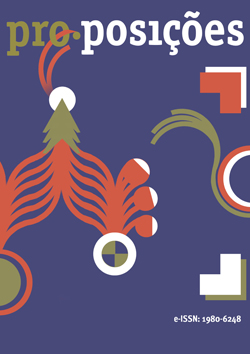Resumo
Os autores deste ensaio bibliográfico dedicam-se a oferecer argumentos para uma reflexão crítica sobre a relação professor (a)-estudante-conhecimento no contexto da cultura digital. Paulo Freire é nosso interlocutor, por meio de suas obras pós-exílio, sobretudo a “Pedagogia da Esperança” e a “Pedagogia da Autonomia”. A “Pedagogia da Esperança” retoma as bases epistemológicas presentes na “Pedagogia do Oprimido, enquanto a “Pedagogia da Autonomia” sintetiza o ato de ensinar em diálogo direto com educadoras e educadores. Concluímos que a relação entre professor (a) e estudantes, em torno do conhecimento, pode ser reconfigurada nos tempos da cultura digital a partir destas contribuições. Não se trata apenas de denúncia, mas também do anúncio: transformar dificuldades em possibilidades.
Referências
Barthel, R., Leder Mackley, K., Hudson-Smith, A., Karpovich, A., de Jode, M., & Speed, C. (2013). An internet of old things as an augmented memory system. Personal and Ubiquitous Computing, 17(2), 321-333. https://doi.org/10.1007/s00779-011-0496-8
Beer, D., & Burrows, R. (2013). Popular culture, digital archives and the new social life of data. Theory, Culture & Society, 30(4), 47-71. https://doi.org/10.1177/0263276413476542
Chen, C. H. (2010). Why do teachers not practice what they believe regarding technology integration? The Journal of Education Research, 102(1), 65-75. https://doi.org/10.3200/JOER.102.1.65-75
Clark, L. S. (2011). Digital media and the generation gap. Information, Communication & Society, 12(3), 388-407. https://doi.org/10.1080/13691180902823845
Featherstone, M. (2000). Archiving cultures. British Journal of Sociology, 51(1), 161-184. https://doi.org/10.1111/j.1468-4446.2000.00161.x
Flecha, R.; Gómez, J., & Puigvert. L. (2001). Teoría sociológica contemporánea. Paidós.
Freire, P. (1978). Pedagogia do oprimido Paz e Terra.
Freire, P. (1992). Pedagogia da esperança. Paz e Terra.
Freire, P. (1996). Pedagogia da autonomia: Saberes necessários à prática educativa. Paz e Terra.
Freire, P., & Shor, I. (1987). Medo e ousadia: O cotidiano do professor Paz e Terra.
Gomez, J. (2008). El amor em la sociedade del riesgo: Una tentativa educativa El Roure, 2008.
Gómez, J., Huete, J. F., Hoyos, O., Perez, L., & Grigori, D. (2013). Interaction system based on Internet of Things as support for education. Procedia Computer Science, 21, 132-139.
Grimm, P., Keber, T. O., & Zöllner, O. (2019). Digitale Ethik: Leben in vernetzten Welt Reclam.
Habermas, J. (2019). Teoria do agir comunicativo: Racionalidade de ação e racionalização social WMF Martins Fontes.
Kant, I. (2005). Textos seletos (F. S. Fernandes, Trad.). Vozes.
Koo, S. G. M. (2015). An integrated curriculum for Internet of Things: experience and evolution [Artigo apresentado]. Frontiers in Education Conference, Massachusetts, Washington, DC.
Marcuse, H. (1999). Tecnologia, guerra e fascismo (Maria Cristina Vidal Borba, Trad.). Editora Unesp.
Mello, R. R, Braga, F. M., & Gabassa, V. (2020). Comunidade de aprendizagem: Outra escola é possível EDUFSCar.
Miorandi, D., Sicari, S., De Pellegrini, F., & Chlamtac, I. (2012). Internet of Things: Vision, applications and research challenges. Ad Hoc Networks, 10(7), 1497-1516.
Nida-Rümelin, J., & Weidenfeld, N. (2018). Digitaler Humanismus: Eine Ethik für das Zeitalter der künstlichen Intelligenz Piper.
Ning, H., & Hu, S. (2012). Technology classification, industry and education for future: Internet of things. International Journal of Communication Systems, 25, 1230-1241.
Steinmaurer, T. (2016). Permanent vernetzt: Zur Theorie und Geschichte der Mediatisierung Springer VS.
Sutherland, J. (2008). Directive decision devices: Reversing the locus of authority in human-computer associations. Technological Forecasting & Social Change, 75(1), 1068-1089.
Wolf, M. Paulo Freire und die Kritische Theorie (2016). [Tese de doutorado, Universität Heidelberg]. Arquivo da Universität Heidelberg. https://archiv.ub.uni-heidelberg.de/volltextserver/23682/
Zhang, T. (2012). The Internet of Things promoting higher education revolution [Artigo apresentado]. Fourth International Conference on Multimedia Information Networking and Security, Washington, DC, United States.

Este trabalho está licenciado sob uma licença Creative Commons Attribution 4.0 International License.
Copyright (c) 2021 Antônio Álvaro Soares Zuin, Roseli Rodrigues de Mello


